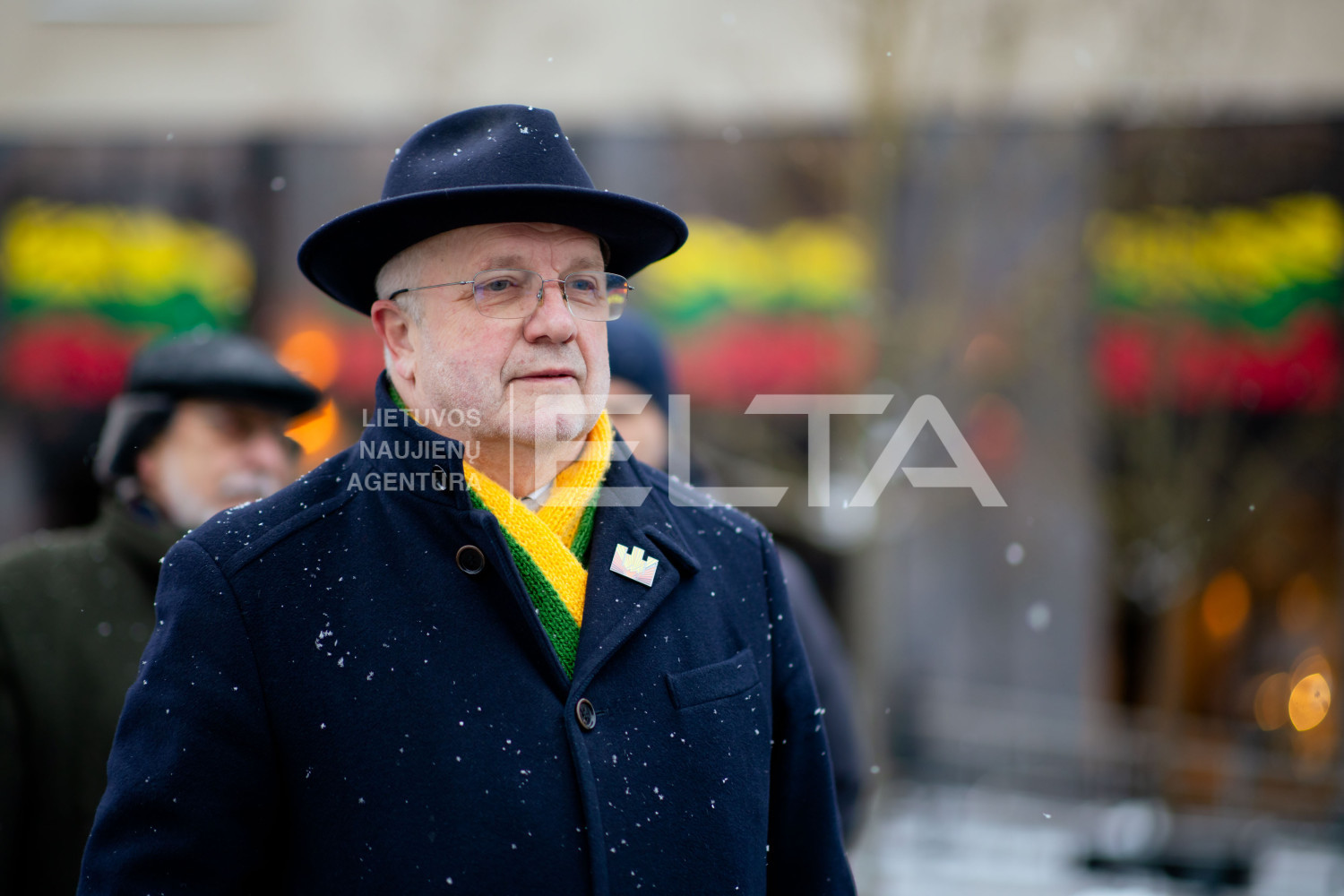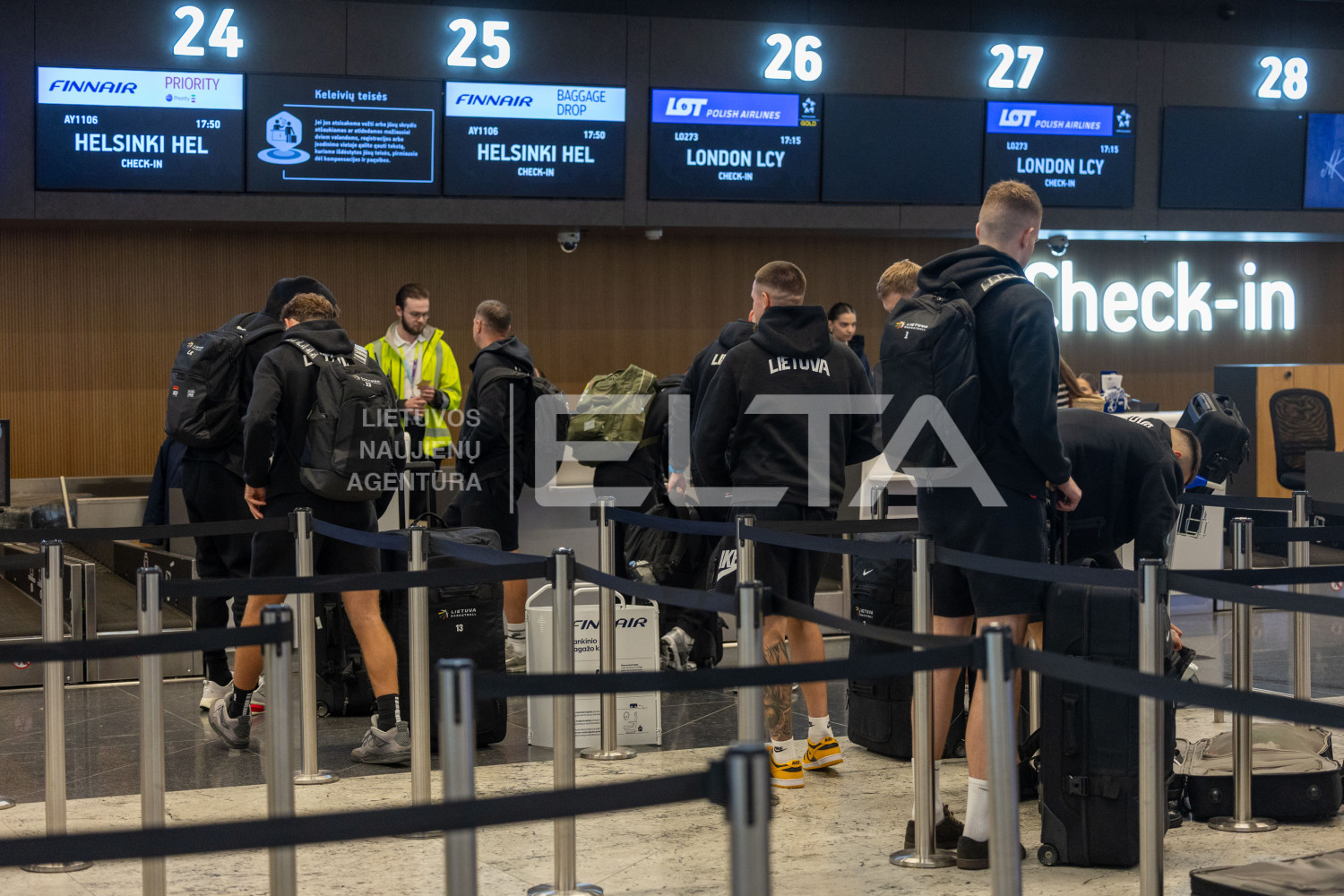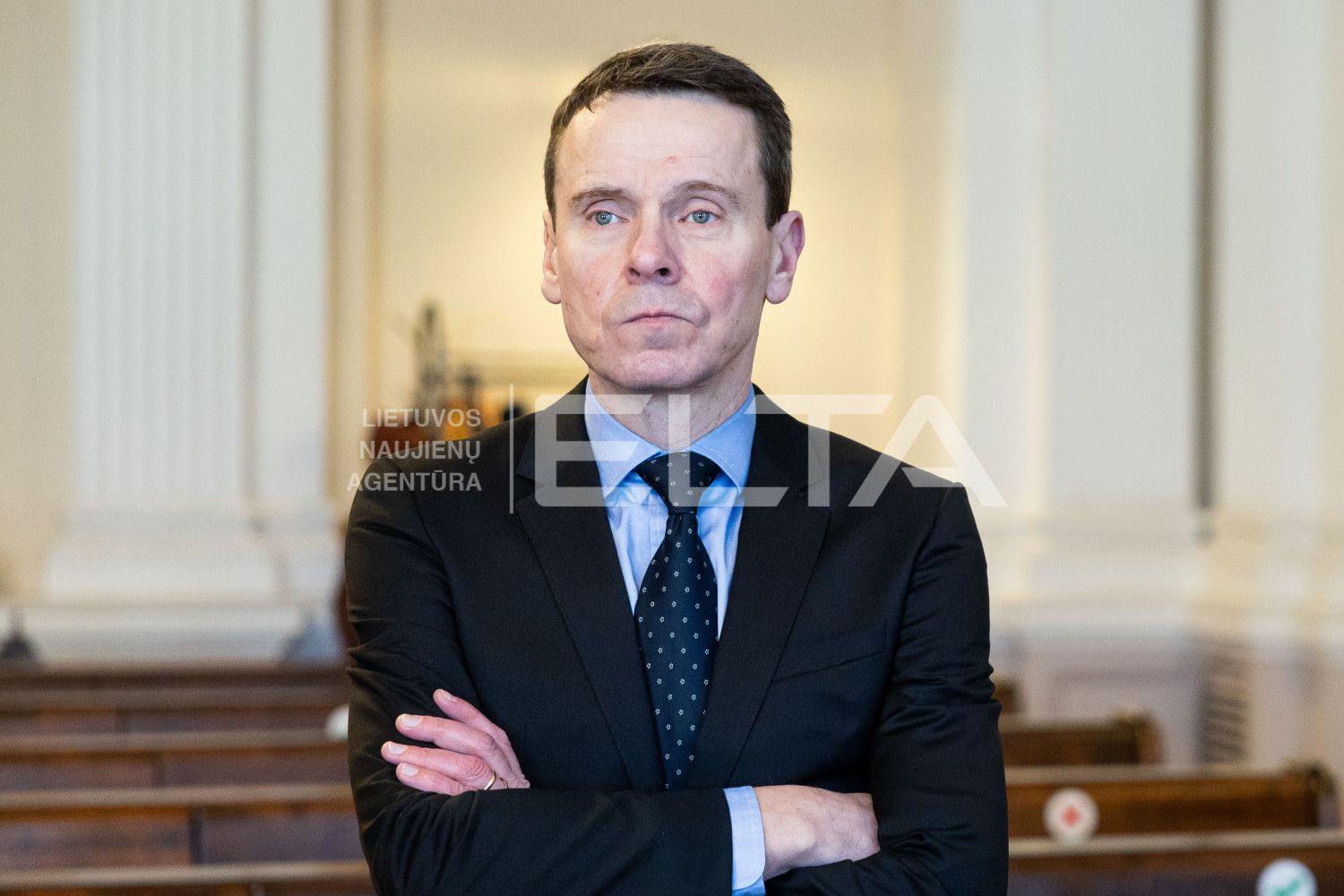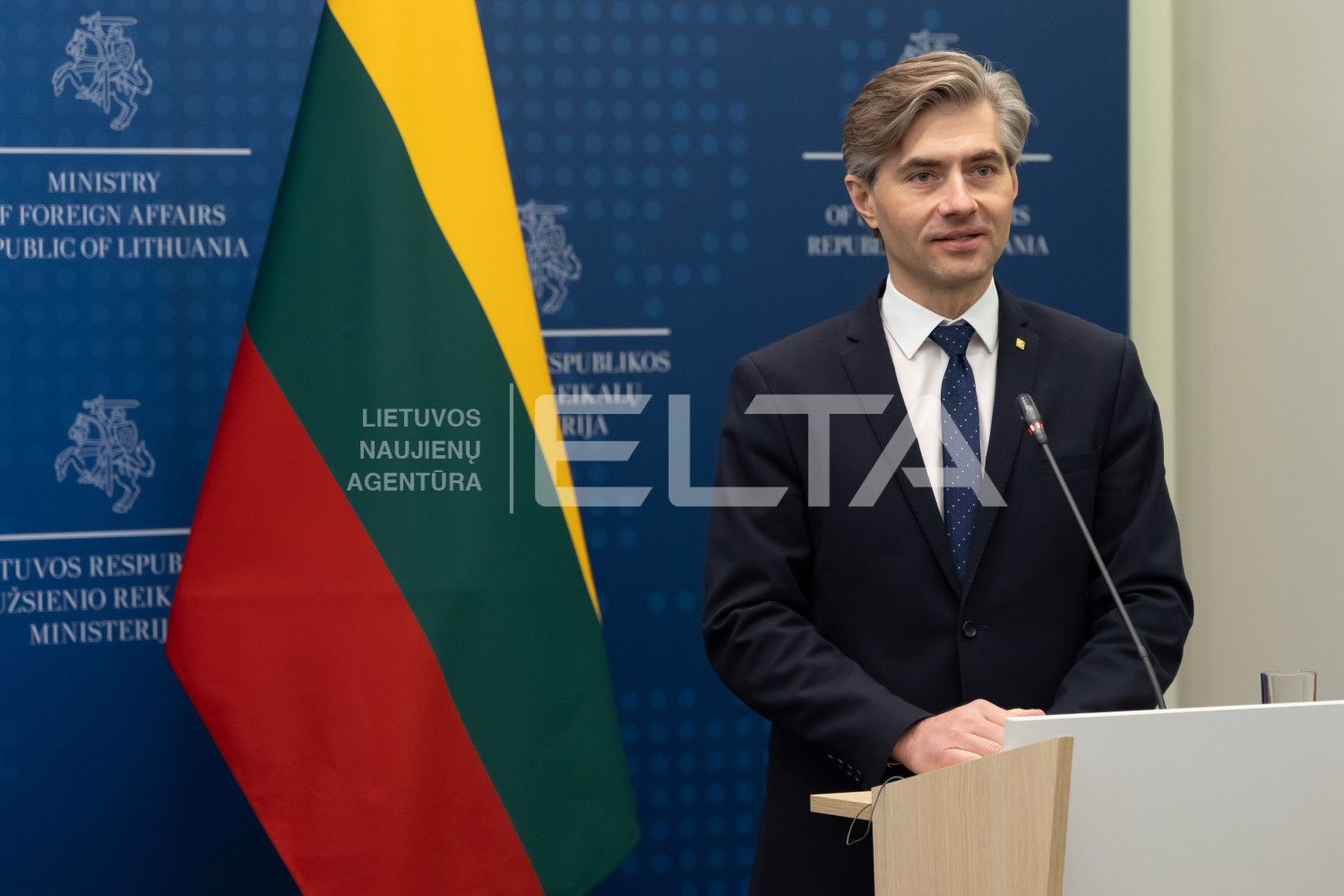ELTA news
Olekas names conditions for Belarus to resume potash fertiliser transit
Vilnius, February 13 (ELTA) – Seimas Speaker Juozas Olekas says Belarus must meet certain conditions before any resumption of potash fertiliser transit through Lithuania, including halting airspace violations, returning detained trucks and releasing political prisoners.
“First of all, the obstruction of our civil aviation must be stopped, our detained vehicles must be returned and, in solidarity with the democratic forces in Belarus, political prisoners held by the regime must be released. We would like to see all of them released,” he told Lietuvos Rytas TV on Friday.
Olekas added that improved economic ties would also depend on an end to Russia’s war in Ukraine.
“If Russia’s aggression in Ukraine were stopped and peace established, then perhaps different economic relations with Belarus would emerge. However, this would require that all of the conditions I mentioned be met,” he said.
Until then, Lithuania and its partners should maintain pressure on President Alexander Lukashenko’s regime, including through sanctions, the Social Democrat veteran said.
“So far, the sanctions regime and its strengthening are working, but not as effectively as we would like,” Olekas said, adding that contacts between the United States and representatives of the Belarusian authorities were also yielding results.
“Violations of our airspace have decreased and [dozens of] political prisoners have been released,” he said.
Olekas stressed the need for European unity ahead of a decision later this month on whether to extend existing sanctions.
In December 2025, US Special Envoy for Belarus John Coale announced that the United States was lifting sanctions on Belarusian potash and said that discussions on sanctions would continue.
Last week, Lithuanian President Gitanas Nausėda said there were no discussions on resuming Belarusian fertiliser transit and that European Union sanctions would remain in place until the Minsk regime changed its policies.
Sanctions on Belarusian potash fertilisers were imposed by US President Joe Biden’s administration in 2021, a year after the Belarusian presidential race, in which Alexander Lukashenko declared victory and cracked down on protesters.
At the time, all US individuals and entities were required to complete transactions with the Belarusian potash producer Belaruskali.
The European Union also sanctioned Belarusian fertilisers in 2022.

Part of Vilnius Airport flooded, flights unaffected – media
Vilnius, February 13 (ELTA) – Some of the Vilnius Airport premises were flooded on Friday due to a water leak, the Delfi news website reported.
State-owned operator Lithuanian Airports (LTOU) said the cause of the incident was under investigation.
“The situation was assessed promptly and the responsible services are working to resolve the problem,” LTOU said in a comment to the outlet, adding that the incident would not affect operations.
“The incident has no impact on flight schedules or airport operations – flights are operating as usual,” the operator said.

Court rules that businessman convicted in high profile corruption case will not be released on parole
Vilnius, February 13 (ELTA) – Kaunas Regional Court on Friday ruled that former vice president of MG Baltic company group, Raimondas Kurlianskis, will not be released from prison on parole.
The ruling of the panel of three judges is final and not subject to appeal.
The judges stated that Kurlianskis’ involvement in the resocialisation process has not been sufficient, whereas his attitude towards the committed crimes has been formal and he tends to justify his behaviour.
The court stated that the release on parole is not an automatic right even if the risk of repeat criminal behaviour is low.
Kurlianskis is serving a custodial sentence of 5 years and 6 months in an open prison. He will have carried out half of his sentence by August 2026.
The Parole Commission in December 2025 recommended against his release noting that he had committed five crimes related to corruption, which were deliberate, systematic and serious, and caused damage to the public as trust in numerous state institutions was undermined.
Kurlianskis was convicted of bribing then leader of the Liberal Movement Eligijus Masiulis with EUR 106,000 on 10 May 2016.
In November 2024, the Supreme Court amended the punishments for the defendants. Kurlianskis and Masiulis were sentenced to 5 years and 6 months in prison, while Labour Party’s MP Vytautas Gapšys – to 4 years and 3 months.
The politicians were accused of taking bribes from MG Baltic in return for supporting or initiating decisions in parliament that favoured the company group, as well as for influencing decisions on winners of public tenders.
Former representative of the Liberal Movement Šarūnas Gustainis was fined EUR 18,800 fir bribery, former Liberal Movement’s MP Gintaras Steponavičius was fined EUR 15,000 for abuse of office.
MG Group, formerly MG Baltic, was fined EUR 1.1 million, the Liberal Movement – EUR 376,600 and the Labour Party – more than EUR 300,000.

It is time to become strong – Budrys in letter to Europe
Vilnius, February 13 (ELTA) – Minister of Foreign Affairs Kęstutis Budrys, who will participate in the Munich Security Conference, has issued a public letter to European leaders calling on them to be decisive, to stop reacting and for Europe to become a geopolitical power.
“Dear Europe, the world is shifting beneath your feet. The power structures are being revisited. Alliances are under scrutiny. Imperial thinking back on the stage. You are prosperous. You are democratic. You are admired. But admiration without strength invites mistreat. Wealth without power invites exploitation. Values without force invite disregard,” Budrys said in the public letter posted on social platform X.
“It is time for you to become strong – stronger than ever before. It is time to grow muscles and show teeth. To be decisive. Daring. Intentional. To stop reacting and start shaping. You must finally become a geopolitical power. A geoeconomic power. A fortress of safety,” stated the foreign minister.
Budrys notes that although Europe is an economic giant, yet it is too often a strategic spectator, and this must end. He says a geopolitical Europe knows exactly where its interests lie.
“It takes its entire perimeter – from Ukraine to the Middle East to North Africa – seriously. It does not outsource its security thinking. It does not whisper when others shout. It speaks with one voice and backs that voice with real force,” he says.
Budrys notes that a geopolitical Europe is able to grow its membership, as enlargement projects power but failure to enlarge projects weakness. He stresses that having Ukraine as part of Europe is thousand times better than having Ukraine as part of Russia. Moreover, a geopolitical Europe is also capable of pursuing a coherent foreign and security policy and possesses instruments to achieve this goal, he says.
“Transatlantic partnership must mean equality, not reliance. Respect is not granted to those who depend indefinitely on others for their own defence. If you want influence, you must carry weight – military, financial, strategic. You cannot shape the world if you are afraid to project power within it,” reads the letter.
Budrys calls on Europe to seize its power as a global economic heavyweight as the EU is the world’s third‑largest economy, a single market of 450 million consumers. Whereas European regulation has already shaped global standards in social rights, data protection and competition. That influence, he says, can extend further – into AI, digital governance, green technologies – if paired with industrial strength.
“A geoeconomic Europe protects its strategic sectors. It secures supply chains at home or with trusted partners. It invests at scale in defence industries, AI, energy independence, and advanced manufacturing. It understands that the single market is its leverage – and uses it to secure its interests,” Budrys writes.
He calls to set the standards and defend European industries, using market access as power. He urges to define the rules of the game, so the rules would not be written elsewhere.
Furthermore, the head of Lithuania’s diplomacy stresses that Europe without ironclad security remains exposed, while security is the foundation upon which prosperity rests. He says Europe must control its borders, protect its infrastructure, shield its digital space, produce what is needed in times of crises and sustain itself in case of prolonged conflict.
“Deterrence must remain credible at every level. Conventional strength is essential. But in a world where nuclear weapons still shape strategic reality, credible nuclear deterrence must also be part of the equation. This does not mean duplicating NATO or weakening the Alliance. It means reinforcing the European pillar within NATO, ensuring that deterrence on the continent remains robust and unquestionable,” says the minister.
“Security costs money. Sovereignty costs money. Freedom costs money.
If you are not willing to pay in investment and resolve, you will pay in dependency and subordination. And once dependency becomes structural, freedom becomes symbolic,” the letter reads.
Budrys argues that a fortress is built not with declarations but with strategy, action and dedication.

Nausėda participates in the Munich Security Conference
Vilnius, February 14 (ELTA) – On Saturday, President Gitanas Nausėda participated in the panel discussion at the Munich Security Conference, “Holding the Line: Defending Europe and Supporting Ukraine”, reports the president’s press service.
In his speech, the president emphasised that defending Ukraine’s territorial integrity, further strengthening military and humanitarian support, and advancing its EU membership are essential guarantees of political security.
“The continued strengthening of military support for Ukraine has to remain a strategic objective of the transatlantic community, ensuring the timely fulfilment of commitments and fair burden-sharing. A firm and active reaffirmation of the policy of non-recognition – neither de jure nor de facto recognition of Russia’s occupation – is vital to Ukraine’s security. Accelerating Ukraine’s integration into the EU is the strongest non-military security guarantee we can offer. EU accession negotiations are a strategic lever for Ukraine’s modernisation and an important motivating factor,” the president said.
The Lithuanian leader noted that pursuing illusions of a quick peace leads to weakening support for Ukraine. According to the president, it is not enough merely to continue current support – it is necessary for all to do more together.
Gitanas Nausėda recalled that at the national level, Lithuania is committed to providing Ukraine with military assistance amounting to at least 0.25 percent of GDP annually, with support reaching 0.28 percent of GDP last year. Lithuania also allocated USD 30 million to the PURL initiative last year, and a similar amount is planned for this year, along with an additional EUR 30 million for the Patriot air defence initiative.
According to the president, Russia’s freedom of action will remain constrained as long as Ukraine continues to fight for its own—and our—freedom and security. “Therefore, I once again call on us to stand shoulder to shoulder and take a more responsible approach to supporting Ukraine. This is an urgent appeal to the entire transatlantic community. Let us demonstrate solidarity through fair burden-sharing. Let us remain united,” the Lithuanian leader underlined.
The debate “Holding the Line: Defending Europe and Supporting Ukraine” also included the participation of German Defence Minister Boris Pistorius, Polish Foreign Minister Radosław Sikorski, Ukrainian Deputy Prime Minister for European and Euro-Atlantic Integration Taras Kachka, and US Senator Elissa Slotkin, Member of the Senate Committee on Armed Services.
Nausėda met with German chancellor at Munich Security Conference
Vilnius, February 14 (ELTA) – President Gitanas Nausėda met with German Federal Chancellor Friedrich Merz at the Munich Security Conference on Saturday. The prime ministers of Estonia and Latvia also participated in the meeting, the presidency reports.
The Lithuanian leader emphasised that he greatly appreciates Germany’s leadership and its continued commitment to strengthening regional security, stressing that Lithuania’s main priority is to prepare for hosting the German brigade in 2027.
“We welcome Germany’s commitment to strengthening security in our region by stationing Germany’s 45th Armoured Brigade in Lithuania. We value Germany’s active participation in the NATO air policing mission and its leadership in advancing EU defence industry development initiatives,” the president said.
Speaking about transatlantic relations, the Lithuanian leader underscored the importance of maintaining strong relations with the United States and the need to enhance Europe’s role in ensuring defence, including through fair burden-sharing. This, he noted, is essential for further strengthening NATO’s deterrence and defence. The president expressed his conviction that the United States recognises that NATO also serves its own security interests.
“Let us not deceive ourselves into thinking that Europe can replace NATO. However, EU Member States have to invest more in defence in any case. We appreciate Germany’s leadership in this process and encourage other allies to step up their efforts. Lithuania, for its part, is already allocating more than 5 percent of its GDP to defence this year,” Gitanas Nausėda underlined.
Kaunas took part the Ukraine Defence Contact Group meeting in Brussels
Vilnius, February 13 (ELTA) – Minister of National Defence Robertas Kaunas attended the 33rd meeting in the NATO Defence Contact Group held together with the NATO Defence Ministerial in Brussels, the ministry said in a press release.
At the session, additional financial assistance to Ukraine opportunities and the country’s most critical needs were discussed, as well as updates from the frontlines and peace negotiations.
“We hear the urgent needs of Ukraine. Lithuania’s military assistance has already surpassed USD 1 billion and we have another USD 265 million earmarked for this year to be used in three priority areas: air defence, Ukrainian drones and long-range artillery ammunition,” Minister Kaunas at the session said.
Kaunas also presented to the Ukraine Defence Contact Group Lithuania’s commitment to further strengthening Ukraine’s defence capabilities. The ministry applies the so-called Lithuanian Model (direct bilateral investment in Ukraine’s defence industry) to contribute USD 38 million so far for production of long-strike drones for the Armed Forces of Ukraine.
This year, additional USD 12 million are planned to be added for the matter. It is noteworthy, that USD 24 million more is earmarked for long-range strike and maritime drone acquisition from the localized Ukraine defence industry aiming to support localization of Ukraine’s defence industry in Lithuania.
At the meeting, the minister pointed out that Lithuania planned to join the Czech initiative with USD 33 million for production of two types of 155 mm artillery ammunition, including long-range strike-capable. USD 6 million more are earmarked for anti-tank mines. In total, Lithuania has rendered military assistance worth of USD 31 million since the start of this year, including power generators, gas tanks, drone neutralization systems and optics.
In addition, Lithuania continues training and rehabilitation of Ukrainian military personnel in our country and effort with Iceland in the Demining Coalition. This year Lithuania plans contributing USD 35.5 million which will be used to purchase mine-proof tactical vehicles from Ukrainian manufacturers.
Nausėda meets with North Rhine-Westphalia Minister President
Vilnius, February 13 (ELTA) – President Gitanas Nausėda met with Hendrik Wüst, Minister-President of the German Federal State of North Rhine-Westphalia, at the Munich Security Conference on Friday, the presidency said in a statement.
The meeting focused on political, economic, and social ties between Lithuania and Germany, as well as cooperation in the fields of defence and security.
“Germany is a strong strategic ally of Lithuania. It is one of the key forces ensuring peace in Europe, particularly on NATO’s eastern flank. Last year, Germany’s 45th Armoured Brigade ‘Lithuania’ was inaugurated. Part of the brigade’s personnel and military equipment come from North Rhine-Westphalia, which is why we feel a special closeness and emotional connection to this region,” President Nausėda said.
He emphasised that Lithuania is fulfilling its commitments related to the permanent deployment of the brigade on time – and even ahead of schedule – in order to ensure the success of this project.
“Germany is also an important ally in cooperation in the field of armaments. Lithuania’s procurements from Germany form a strong and integral pillar of our strategic defence partnership. We are also seeking to expand cooperation in the defence industry by offering particularly attractive investment conditions for the sector,” the Lithuanian leader noted.
Speaking about the artillery ammunition factory in Baisogala, which is being built by the German company Rheinmetall, the President stressed that this is not merely an industrial project. According to the Head of State, it is a strategic step aimed at ensuring a secure supply chain and strengthening our deterrence and defence capabilities.
“The deployment of the German brigade creates a unique opportunity to further strengthen our political, economic, and social ties. We seek to foster closer people-to-people contacts between our nations. It is particularly important to promote the teaching of the German language in Lithuania,” the president said.
The Lithuanian leader also underscored that special attention is being given to the education of the children of German military personnel: a German kindergarten and German-language primary school classes have already been established in Vilnius, and from this year, learning opportunities are also being created for older students.
Finally, President Nausėda said, greater emphasis is being placed on promoting Lithuanian culture in Germany and German culture in Lithuania.
Surplus on current account balance grows to EUR 473mn in December – central bank
Vilnius, February 13 (ELTA) – The surplus on Lithuania’s current account balance (CAB) grew significantly from EUR 143.2 million to EUR 473.0 million in December, compared to November, according to the balance of payments released by the country’s central bank on Friday.
The increase of the CAB surplus was mainly underpinned by a decrease in the primary income deficit and an increase in the surplus on the balance of services. The decrease in the primary income balance deficit (by EUR 57.6 million) was primarily triggered by an increased flow of European Union subsidies to Lithuania.
Exports of service which grew significantly faster than imports (by 11.5% and 5.9% respectively) pushed up the service balance surplus (by 19.8%) to EUR 908.9 million.
With a decline in exports and imports of goods (by 7.8% and 7.6% respectively), the foreign trade deficit narrowed (by 6.7%), amounting to EUR 488.3 million.
The surplus on the secondary income balance increased from EUR 32.0 million to EUR 110.0 million.
The negative net flow of financial account investment (EUR 591.9 million) was determined by the negative net flows of other investment (EUR 816.4 million) and direct investment (EUR 260.6 million), the effect of which was offset by positive net flow of portfolio investment (EUR 455.4 million).
ELTA Brief: STT questions ex-PM Paluckas, parlt board extends mandate of LRT working group
Vilnius, February 13 (ELTA) – ELTA Brief provides a concise overview of the key events of Friday, 13 February, in Lithuania and around the world.
On Friday, the Special Investigation Service (STT) confirmed it had questioned former prime minister and Social Democrat MP Gintautas Paluckas as a special witness in a pre-trial probe into abuse of office and illegal enrichment. The same day, the Board of the Seimas, acting on a request from the LRT working group, extended the deadline for preparing a draft law on the public broadcaster’s governance by ten days. Meanwhile, the Seimas Committee on National Security and Defence (NSGK) urged the Government to investigate possible official negligence in forming the state reserve.
LITHUANIAN POLITICAL NEWS
The Special Investigation Service (STT) questioned former prime minister Gintautas Paluckas, former prime minister, as a special witness in a pre-trial probe into abuse of office and illegal enrichment. The MP was questioned as a person who could give evidence about his criminal activity, a STT spokeswoman said. The pre-trial investigation is ongoing, with data being collected and evaluated, and no charges have been filed yet. Earlier this week, while investigating a major corruption case, the STT conducted searches of the offices and homes of Democrat leader MP Saulius Skvernelis and Conservative MP Kazys Starkevičius.
The Vilnius District Municipal Council decided not to consider a proposal to rename streets honouring Polish cardinal Henryk Gulbinowicz, who had been sanctioned by the Vatican for paedophilia. Council member Daniel Ilkevič, who submitted the initiative, said the clergyman also had victims in the Vilnius district. Councillors from the Lithuanian Polish Electoral Action–Christian Families Union opposed the move, arguing that not all facts about Gulbinowicz had been made public. In 2020, the Vatican punished the cardinal for sexual abuse of minors and for covering up crimes by other clergymen. Gulbinowicz, now deceased, was stripped of his honorary titles in Poland, and his honorary citizenship was revoked. He remains an honorary citizen in the Vilnius district, where three streets still bear his name.
The Board of the Seimas approved a request from the working group tasked with improving legal oversight of Lithuanian National Radio and Television (LRT), extending the deadline for the draft law by ten days. Led by Juozas Olekas, the group was originally scheduled to finish the draft by 14 February; it is now expected by 24 February. The working group decided to turn to the Board of the Seimas over extension on Tuesday.
Kaunas Regional Court on Friday ruled that former vice president of MG Baltic company group, Raimondas Kurlianskis, will not be released from prison on parole. The ruling of the panel of three judges is final and not subject to appeal. Despite behaving properly, working, maintaining social ties, and being transferred to an open-type prison, the convicted person has not yet fulfilled the objectives of the sentence, the judges said. Kurlianskis is serving a custodial sentence of 5 years and 6 months in an open prison. He will have carried out half of his sentence by August 2026. The courts found that meetings between Kurlianskis and former Seimas members, most often initiated by the former vice president of the MG Baltic concern (now MG Group), were systematic and coordinated around political issues affecting MG Baltic. Bribes to politicians and parties were disguised as support for legal entities or discounts on political advertising.
LITHUANIAN BUSINESS NEWS
The Seimas Committee on National Security and Defence (NSGK) said the Government should investigate possible negligence by officials in managing the state reserve. The decision followed a State Audit Office report that the reserve is not adequately prepared for real threats. Committee chair Rimantas Sinkevičius said the Government must identify any officials who failed in their duties and take disciplinary or dismissal action. He also said that the committee would continue to exercise parliamentary oversight of the matter.
MPs plan to collect signatures for an appeal to Seimas Speaker Juozas Olekas to remove Tomas Domarkas from the Parliament’s Committee on Environment Protection. But committee chair Social Democrat Linas Jonauskas said Domarkas himself must decide whether to stay or resign, and the coalition council may also discuss the matter. The journalistic investigation team of public broadcaster LRT found that Klaipėda Regional Prosecutor’s Office launched the probe in September 2025 to assess potential environmental damage caused in a land plot owned by the politician’s father Liudas Domarkas. Environmental officials estimate, EUR 4.6 million in damage may have been done. Allegations were brought against 14 current and past employees of the company Redus.LT. The investigation detected that the registration address of the Klaipėda-based firm is in Vieštovėnai village, the home of Domarkas’ father, and that the suspected violations had been made nearby. According to LRT Investigative Team, Domarkas himself had work-related ties to Redus.LT before becoming an MP.
Three winners of a Ministry of Economy and Innovation competition tested their airspace protection measures for the first time. The contest, launched in October, aimed to encourage companies to develop national security technologies for rapid responses to threats from weather balloons, drones, or other airborne objects. Three consortia were selected in the first stage, represented by IT Logika, Teltonika EMS and Dangaus Šviesos. Their solutions include airship platforms, drone stations, radars, and AI integration. Each winner was granted EUR 100,000. Weather balloons launched from Belarus have forced Vilnius Airport to close several times since October, prompting the Government to declare a nationwide emergency.
FOREIGN NEWS
The Munich Security Conference opened in Germany. The high-level talks will run until Sunday with attention expected to focus on Ukraine, marking four years since Russia’s full-scale invasion, and on Iran, which, US President Donald Trump has warned, could face military strikes if a nuclear deal is not reached soon. But just over a year into Trump’s second term, organisers say the spotlight may fall on growing US–Europe tensions. More than 60 world leaders and around 100 foreign and defence ministers are attending.
Russia said a new round of talks with US and Ukrainian officials will take place next week. It is scheduled for 17-18 February in Geneva, Kremlin spokesman Dmitry Peskov said. The previous rounds in Abu Dhabi failed to yield a breakthrough, with Moscow and Kyiv still sharply divided on the key issue of territory. Russia is pressing Ukraine to withdraw from the eastern Donetsk region, around a fifth of which remains under Kyiv’s control. Ukraine rejects a unilateral withdrawal and wants strong Western security guarantees to prevent a new Russian offensive after a ceasefire.
Four Lithuanian nationals were among eight people detained in Poland over a scheme to smuggle cigarettes from Belarus using balloons. According to the Polish Border Guard, four of the detainees are Polish nationals aged 20 to 44, and four are citizens of Lithuania aged 30 to 34, a spokeswoman said. The detainees are accused of serious tax crimes and breaches of national security laws. If convicted, they face at least three years in prison.
Ukrainian skeleton racer Vladyslav Heraskevych said he still hopes to compete at the Milan-Cortina Olympics as the Court of Arbitration for Sport (CAS) began hearing his appeal against his disqualification on Friday. He was barred over a dispute about a helmet depicting Ukrainian athletes killed in the war with Russia, which he sought to wear in competition. The CAS hearing opened at a hotel in Milan. CAS has set up a special division to fast-track Olympic cases, but it was unclear how long the proceedings would take. Director General Matthieu Reeb said he expected a verdict later on Friday, though he cautioned that setting a precise deadline was difficult.
Green hydrogen could provide up to 30% of electricity system flexibility by 2050 – Amber Grid
Vilnius, February 13 (ELTA) – As Lithuania actively prepares for the development of hydrogen energy and plans the necessary infrastructure, Lithuania’s gas transmission system operator Amber Grid has conducted an analysis of the interaction between the green hydrogen ecosystem and the electricity sector, it said in a press release.
Green hydrogen is produced using renewable energy sources (such as solar or wind) through water electrolysis. This is a clean method of hydrogen production compared to other production methods that generate significant amounts of carbon dioxide emissions.
According to the analysis, green hydrogen producers will have the technical capabilities to participate in electricity system flexibility service markets and to provide flexibility services.
“Flexibility needs in the electricity grid are increasing due to the growing integration of variable renewable energy sources (RES), and electrolysis facilities have the potential to respond to these needs. However, participation in flexibility service markets would most likely not be the main source of revenue, but rather one of the ways to optimize hydrogen production operations. Properly planned participation in flexibility service markets could help green hydrogen producers reduce operating costs, which in the long term would account for the largest share of the final green hydrogen price,” says Danas Janulionis, Head of the Energy Transformation Centre at Amber Grid.
Given the projected significant expansion of renewable energy sources, national strategic energy documents also foresee the development of flexible capacity services and the contribution of technologies providing such services. Enabling electrolysis technologies to provide flexibility services will be significant – according to the National Energy Independence Strategy, by 2050, 30% (or 6.5 GW) of flexible capacities will consist of green hydrogen production electrolysis facilities.
How electrolyzers could participate in flexibility service markets and whether they could operate as flexible consumers will depend on the chosen electrolyzer technology and the technical capabilities of the entire hydrogen production facility, as well as on the selected business model, the definition of the main product, and the needs of the end user.
Janulionis notes that although electrolysis technologies have technical capabilities to provide flexibility services, albeit with certain limitations, the current potential for these facilities to participate in flexibility markets remains limited due to the still-developing green hydrogen ecosystem. The analysis identified three main measures that would support the development of the green hydrogen sector and enhance its interaction with the electricity sector.
“The emergence of hydrogen transport infrastructure would allow hydrogen producers to address hydrogen storage challenges and enable more flexible green hydrogen production. The introduction of a dynamic electricity transmission tariff would allow hydrogen producers to produce hydrogen more cost-effectively and reduce business costs. The definition of national flexibility needs and the development of flexibility services could create conditions for hydrogen production facilities to discover new revenue streams,” says Janulionis.
STT questions ex-PM Paluckas as special witness in abuse, illegal enrichment probe
Vilnius, February 13 (ELTA) – The Special Investigation Service (STT) questioned MP Gintautas Paluckas, former prime minister, on Friday as a special witness in a pre-trial probe into abuse of office and illegal enrichment, the anti-corruption agency has said.
“During the pre-trial investigation, Gintautas Paluckas was questioned as a person who could give evidence about his criminal activity. In society, this is known as a special witness,” STT spokeswoman Renata Keblienė told ELTA.
She added that the investigation is ongoing, with data being collected and evaluated, and that no charges have been filed.
Under the Criminal Code, civil servants who abuse their position or exceed their authority, causing significant damage, face fines, arrest, or up to four years’ imprisonment. Those owning property in value of over 900 MGLs (minimum income standard), which is around EUR 45,000, that could not have been legally acquired face similar penalties.
Last summer, Paluckas stepped down as prime minister after journalistic investigations raised questions about his past business dealings. The entire Social Democratic-led government resigned as a result in early August.
Kapčiamiestis training area to boost Lazdijai region economy with jobs, higher turnover – ministry
Vilnius, February 13 (ELTA) – The Kapčiamiestis training area could provide stable, long-term economic growth for the region, an analysis by the Ministry of the Economy and Innovation shows. This would have a positive impact on local businesses, employment, municipal revenues and the overall quality of life, the ministry said in a press release.
Establishing the training area is a significant step not only in strengthening Lithuania’s defence capabilities, but also in providing a long-term boost to the economic and social development of the Lazdijai district, according to the ministry.
“The development of military infrastructure in regions often forms part of regional policy – it encourages investment, increases demand for services, and creates conditions conducive to sustainable economic activity. In addition, calculations show that if the Kapčiamiestis training area were to operate at full capacity, the Lazdijai district municipality could rise to 41st place in the quality of life index ranking, overtaking 13 other municipalities. This change would be driven mainly by increased economic activity, higher investment in the region, a slight increase in average wages, falling unemployment and improved transport infrastructure,” says Titas Budreika, chief economist at the ministry.
According to the municipality quality of life index calculated by the Ministry of Finance, Lazdijai District Municipality currently ranks 54th out of 60.
The fourfold impact of investment on the region’s economy
In the case of the Kapčiamiestis training area, the expected economic impact will manifest itself through three main channels: direct, indirect and promotional.
The direct impact includes state investment in constructing and operating the training area, as well as creating new jobs at the facility itself. The indirect impact will be felt through supply chains – local businesses will be able to provide construction, logistics, repair, catering, cleaning and other services. The promotional effect will be seen through increased consumption in the region, as training area employees and military personnel will spend their income in local businesses, stimulating retail trade, the service sector, and entertainment.
Budreika states that international studies confirm the benefits of this type of investment. Calculations by the US non-profit research organisation RAND suggest that the multiplier effect of military spending in the local area is around 4. This means that every euro spent directly increases the local economy by 4 euros through economic ties.
“The scale of the impact depends directly on the size of the training area and the capacity of businesses operating in the region. If local businesses are able to meet the needs arising from the training area’s presence – such as catering, logistics, construction and retail – the effect could be even greater,” the economist said.
The growth of local businesses could reach several million euros per year
The economy in the Lazdijai district municipality is small. Currently, only 2,850 people work in the district, but the establishment of the Kapčiamiestis training area is expected to create around 100 new jobs for military and service personnel. This would represent a 3.4% increase in employment in the district.
According to Budreika’s calculations, a fully operational training area would increase the turnover of local companies by around 8%, or approximately EUR 17 million per year. The increase in business activity would also contribute directly to the municipal budget – it is estimated that the additional revenue could reach EUR 3.4 million per year.
According to Budreika, the training area could stimulate change in areas where the Lazdijai district municipality lags behind other municipalities. Budreika also emphasises the importance of the Kapčiamiestis training area in the broader context of state policy.
“While strengthening the country’s defence, we must also consider the future of the regions. Projects such as the Kapčiamiestis training area allow us to balance national security needs with long-term economic and social goals for the regions,” he said.
Themes










